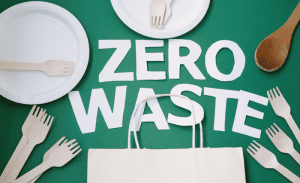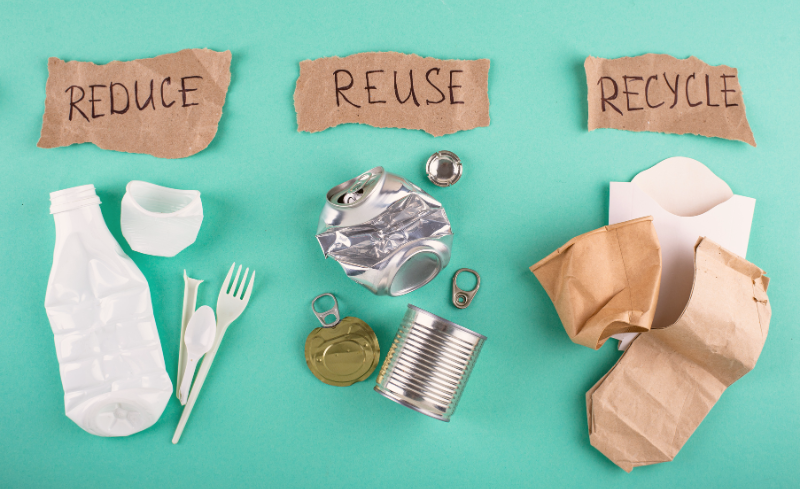Every day, millions of people make decisions that impact the amount of waste we generate. From the packaging of a product to the final destination of an appliance, everything is part of a chain that can lead to the accumulation of waste or to a more efficient Circular Economy. International Zero Waste Day is an opportunity to reflect, change habits and rethink the way we produce and consume.
WHY IS IT IMPORTANT TO BE “ZERO WASTE”?
Waste generation has increased exponentially in recent decades, and without proper management, its environmental and social impact can be devastating.
International Zero Waste Day is not just a date to reflect, but an opportunity to change habits and rethink the way we produce and consume, integrating the Circular Economy as a way to transform our relationship with resources and waste.
Thinking about a world without waste may seem utopian, but the reality is that many communities and companies are already successfully implementing Zero Waste strategies.
The key is to consider waste as a resource and think about how it can be reused and not thrown away.
At TMA, a company specialising in waste management, we are committed to this approach, working to ensure that the materials that arrive at our plants are recycled, valued or treated efficiently.
We believe that each waste is an opportunity to be transformed into a new resource.
TOWARDS A MORE SUSTAINABLE FUTURE: KEYS TO ACHIEVING ZERO WASTE
Both the Zero Waste philosophy and the Circular Economy are fundamental to creating a more sustainable future.
Together, these two philosophies provide us with a framework to transform our economic and consumption system, protecting the planet’s resources and reducing negative impacts on the environment.
Being Zero Waste: the Zero Waste philosophy
The Zero Waste philosophy focuses on reducing the amount of waste generated as much as possible. Rather than focusing solely on recycling, it promotes a radical change in consumption and production habits, and that, from the outset, less waste is generated.
 The key principles of the Zero Waste philosophy include:
The key principles of the Zero Waste philosophy include:
-
- Think about product design: Choose durable, repairable and recyclable products, minimising waste from conception.
- Reduce: Reduce the amount of waste in our lives, from buying food to choosing reusable packaging.
- Reuse: Give objects and materials a second life, reducing the need for new products.
- Recycle: If waste cannot be avoided, ensure that materials can be effectively recycled.
- Compost: Use organic waste to produce compost that can be used in agriculture.
By applying these principles, both companies and individuals can begin to reduce their environmental impact. Every small decision counts, from choosing reusable packaging to repairing an object instead of throwing it away.
Through these changes, the Zero Waste philosophy seeks to minimize waste generation and promote a more responsible lifestyle.
Circular Economy and Waste Reduction
The Circular Economy goes beyond the concept of reduce, reuse and recycle. It is an economic model that proposes that products and materials should remain in use for as long as possible.
Instead of following a linear cycle of “extract, produce, consume and dispose”, the Circular Economy seeks to close that cycle, preventing resources from being lost at the end of their useful life.
The circular model promotes that products are designed to last longer, be easily repaired and recyclable, and that their materials can be recovered for the manufacture of new products, in order to minimize waste.
Through waste reduction, the circular economy helps to reduce the extraction of new resources, which, in turn, reduces the environmental impact.
In addition, the Circular Economy promotes the use of recycled materials and the reuse of components, which contributes to maintaining the value of resources within the economy, creating an endless cycle of use.
In this sense, the Circular Economy and the Zero Waste movement are deeply connected. Both seek to optimize resources and minimize waste.
While Zero Waste emphasizes avoiding waste generation from the start, the Circular Economy creates a system in which what has been used can be recycled, repaired or reintroduced into the production cycle on an ongoing basis.
The aim of the Circular Economy is to keep resources in use for as long as possible, reducing the extraction of new materials and maximizing the use of existing ones.
Reuse, Recycling and Recovery
Reuse is one of the cornerstones of both the Zero Waste philosophy and the Circular Economy.

Reuse is one of the cornerstones of both the Zero Waste philosophy and the Circular Economy.
This practice consists of giving objects a second life, either by repairing them or reusing them in another context.
For example, old furniture can be restored, recycled plastics can be turned into new products, or clothing can be renovated and sold second-hand.
Recycling comes into play when reuse is not possible.
Materials that have been used and can no longer be repaired are recycled to recover their components and produce new products.
However, recycling is not always enough if the root of the problem is not addressed.
Therefore, the key is to design products so that they can be more easily recycled, which in turn encourages a Circular Economy where resources remain in use.
Waste recovery is another important concept within the circular economy. It refers to the process of converting waste into a useful resource, such as energy, compost or recycled materials.
This not only reduces the amount of waste we throw away but transforms waste into valuable products, closing the life cycle of materials.
Innovation and Sustainable Technologies
Technological innovation plays a fundamental role in the transition towards a circular economy and in the adoption of the Zero Waste philosophy.
New technologies allow the development of more sustainable products, which are easier to recycle, longer lasting and less harmful to the environment.
For example, advanced recycling technologies are allowing more efficient separation of materials, making it easier to reuse them instead of being discarded.
Furthermore, digital technologies are helping companies to better manage their waste, optimising their production processes and reducing waste at every stage.
Smart cities and smart grids also play a key role, allowing for more efficient management of energy and material resources.
These technological advances allow the principles of the Circular Economy and Zero Waste to be integrated more effectively into cities, reducing environmental impact and promoting sustainability.
HOW TO BE ZERO WASTE IN EVERYDAY LIFE
Eliminating waste 100% can be a challenge, but reducing it drastically is entirely possible.
Some keys to doing so include:

-
- Reduction at source: Before buying, ask yourself if you really need that product or if there is an alternative without packaging or with recyclable materials. For example, many stores already allow buying in bulk, eliminating unnecessary packaging.
- Smart reuse: Cloth bags, refillable bottles, glass containers to store food… Small changes that, applied on a large scale, generate a positive impact. A restaurant that promotes returnable packaging can considerably reduce its generation of plastics.
- Conscious recycling: Correctly separating waste helps it to be recovered and reused in new production cycles. A company that implements internal recycling points facilitates the correct management of materials such as paper, cardboard and plastics.
- Waste recovery: Transforming waste into new resources through innovative processes, such as converting plastics into alternative fuels.
- Organic waste composting: Transforming food scraps into compost reduces the amount of waste sent to landfills and generates a valuable resource for the earth. This is especially useful for cafes and restaurants that generate large volumes of organic waste.
ZERO WASTE COMPANIES: BUSINESS STRATEGY AND ZERO WASTE
Companies play a fundamental role in reducing waste.
At TMA, we work with companies from all sectors that seek to minimize their environmental impact through:

-
- Recycling and material recovery programs.
- Efficient waste management strategies to reduce waste, with the collaboration of companies specialized in waste management.
- Certifications such as the Zero Waste seal, which accredits a real commitment to sustainability.
The proper treatment of waste is essential to reduce its environmental impact.
Specialized companies, such as TMA, play a key role by offering solutions for the collection, separation and recovery of waste, ensuring that it is treated efficiently and sustainably.
Benefits of adopting a zero waste strategy
Implementing a Zero Waste approach in companies is a commitment to the environment and also provides multiple benefits for companies and society in general:
-
- Lower environmental impact: Soil, water and air pollution is reduced, as well as the emission of greenhouse gases.
- Economic savings: Efficient waste management reduces disposal costs and optimizes the use of resources.
- Greater competitiveness: Companies aligned with sustainability attract consumers and strategic partners committed to environmental responsibility.
- Regulatory compliance: Adapting to environmental regulations and obtaining ecological certifications improves the corporate image and avoids legal sanctions.
Zero Waste good practices for companies
Companies have the ability to lead change with waste reduction policies that optimize processes and generate a positive impact on the environment.
Some key strategies include:
-
- Sustainable product design: Betting on recyclable materials, returnable packaging or refill systems can make a difference. Many brands have already replaced single-use packaging with reusable or biodegradable options.
- Supply chain optimization: Reducing waste at the source is essential. For example, by minimizing product packaging or choosing suppliers with sustainability certifications.
- Reviewing internal processes: Many companies generate large amounts of unnecessary paper. Digitizing documents and promoting the responsible use of office materials helps reduce waste.
- Circular Economy in the company: Recovering used materials and reintroducing them into the production process is a great strategy. Some industries already work with reverse logistics systems to recover products at the end of their useful life and give them a second life.
ZERO WASTE CERTIFICATION: BEING ZERO WASTE MEANS COMMITMENT TO BUSINESS SUSTAINABILITY

Zero Waste Certification is a crucial recognition for companies committed to sustainability and the circular economy.
This certification guarantees that an organization manages to manage its waste in such a way that at least 90% of it is reincorporated into the production cycle, avoiding its final disposal in landfills or incinerators.
This seal not only reflects a solid environmental commitment, but also positions companies as responsible benchmarks for their customers, partners and society in general.
TMA has the Zero Waste Certification. This recognition highlights and endorses our ability to offer innovative and effective solutions that minimize environmental impact, while promoting sustainable practices throughout the value chain.
Having the Zero Waste Certification demonstrates that operating responsibly and efficiently is possible, even in highly challenging industries.
In compliance with corporate sustainability objectives, when a company has Zero Waste Certification, it reaffirms its commitment to sustainability, obtains tangible environmental benefits, improves corporate reputation and strengthens customer trust.
In the framework of the International Zero Waste Day, this certification symbolizes a firm step towards the global goal of minimizing the environmental impact of our activities.
HOW TO IMPROVE WASTE MANAGEMENT IN COMPANIES WITH TMA
At TMA, we work with organizations that seek to minimize their environmental impact through innovative and efficient solutions:
-
- Specialized collection and treatment services: We adapt our solutions to each type of company to guarantee efficient management, complying with current regulations and optimizing disposal and recovery processes.
- Recovery and recycling processes: We help transform waste into new resources, reducing the amount of discarded materials and promoting reuse in the industry.
- Advice on waste reduction strategies: We work with companies to identify opportunities for improvement in their production chain, waste reduction and resource efficiency.
- Environmental certifications: We guarantee compliance with sustainability standards.
Many companies have already taken the step, with advice from companies specializing in waste management and incorporating good practices such as eliminating unnecessary packaging, optimizing production and establishing material recovery systems.
The result is a more efficient, sustainable business model aligned with the expectations of a society that demands environmental responsibility
ZERO WASTE PHILOSOPHY IN WASTE MANAGEMENT
Proper treatment of waste is essential to reduce its environmental impact, and the Zero Waste philosophy plays a key role in this process.
Specialized companies, such as TMA, are essential to implement practices that not only manage waste appropriately, but also encourage the transition to a Zero Waste model.
Below are some of the actions we take at TMA to implement this philosophy:
-
- Reducing waste generation from the source: Encouraging companies to rethink their consumption and waste management habits, choosing durable, reusable products with less packaging. This implies a change of mentality towards responsible consumption.
- Reusing materials and products: Promoting reuse instead of disposal. TMA encourages the repair of objects and the reintroduction of products into the value chain, reducing the need for new materials.
- Recycling and recovery: Maximising recycling efficiency by using advanced technologies that enable the separation and sorting of materials. This helps to recover valuable resources, such as plastics, metals and paper, for reintegration into the production of new products.
- Low-emission transport: Reducing the carbon footprint by using fleets of electric vehicles or vehicles with alternative fuels for waste transport. This helps to minimise the emissions associated with the transfer of materials to recycling or treatment plants.
- Promoting the Circular Economy: Working on processes that incorporate recycled materials, reducing the need for new raw materials. This benefits the environment and promotes a shift towards a more sustainable product life cycle, where materials are continuously reused and recirculated.
By applying these practices, TMA manages waste efficiently and also contributes to promoting a Zero Waste culture in which waste reduction and responsible use of resources are prioritised.
This approach is key to business sustainability and has a direct impact on improving the environment and reducing the environmental footprint globally.
ZERO WASTE BY TYPE OF WASTE
Not all waste can be managed in the same way.
Each type of waste requires specific strategies to reduce its impact and promote its reuse or recycling.
Below, we explore how to apply the Zero Waste concept according to the nature of each waste:

-
- Plastic waste: One of the greatest environmental challenges. Reducing its use involves promoting reusable packaging, eliminating single-use plastics and promoting biodegradable or compostable alternatives.
- Electronic waste: Planned obsolescence generates tons of technological waste. Promoting the repair of devices, the reconditioning of equipment and the recycling of components is key to avoiding its accumulation in landfills.
- Organic waste: Food waste and biodegradable materials can be converted into compost or used to generate bioenergy, avoiding waste and adding value to the production chain.
- Hazardous waste: Chemical substances, oils and polluting materials require safe management protocols and specialized recycling to avoid environmental and health damage.
A WORLD WITHOUT WASTE: REALITY OR UTOPIA?
Achieving a Zero Waste society is not an unattainable goal, but a path that requires everyone’s participation.
The transition to a circular economy is possible and is already underway.
Every decision counts: from how we buy and consume to how companies manage their waste.
Through technology, innovation and collaborations with private companies and public administration, we work to reduce the environmental impact of waste and move towards a more efficient and sustainable waste management model.
At TMA, we believe that sustainability is a shared responsibility. International Zero Waste Day reminds us that change begins with every action, large or small.
Companies and citizens can make a difference with responsible decisions that reduce waste generation and promote the circular economy.
Companies that adopt Zero Waste strategies will not only benefit the planet, but will also gain in competitiveness and reputation. From small businesses to large industries, each sector has opportunities to innovate and minimize its environmental impact.
At TMA, we are committed to a more sustainable future.
If your company wants to move towards more efficient waste management, we can help you implement solutions tailored to your needs.
Join the Zero Waste movement and make a difference!
We take care of our clients and we take care of the environment.
We are much more than comprehensive waste management.
Do you need efficient waste management or more information about the services we offer at TMA? Write to us at comercial@tma.es and we will be happy to provide you with a personalized proposal, fully adapted to your needs.
Discover our comprehensive Waste Management Services.
Follow us on TMA’s LinkedIn. Subscribe to our YouTube channel.
Contact us, we will be happy to advise and inform you.




